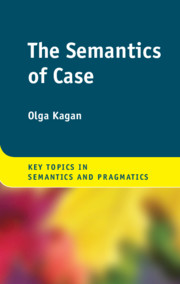Refine search
Actions for selected content:
10 results
Introduction
-
-
- Book:
- The Cambridge Handbook of Role and Reference Grammar
- Published online:
- 08 June 2023
- Print publication:
- 22 June 2023, pp 1-14
-
- Chapter
- Export citation
Chapter 12 - Group Effects and Religion
-
- Book:
- The Cognitive Neuroscience of Religious Experience
- Published online:
- 02 June 2022
- Print publication:
- 09 June 2022, pp 223-237
-
- Chapter
- Export citation
Abstract structures and meaning in Japanese dative structural priming
-
- Journal:
- Applied Psycholinguistics / Volume 43 / Issue 2 / March 2022
- Published online by Cambridge University Press:
- 21 January 2022, pp. 411-433
-
- Article
-
- You have access
- Open access
- HTML
- Export citation
6 - Semantics
- from Part 3 - Structure and Meaning
-
-
- Book:
- Introducing Linguistics
- Published online:
- 22 April 2021
- Print publication:
- 21 January 2021, pp 219-250
-
- Chapter
- Export citation
2 - Dative Case
-
- Book:
- The Semantics of Case
- Published online:
- 02 April 2020
- Print publication:
- 16 April 2020, pp 39-69
-
- Chapter
- Export citation
Chapter 13 - Case in Germanic
- from Part II - Morphology and Agreement Systems
-
-
- Book:
- The Cambridge Handbook of Germanic Linguistics
- Published online:
- 31 March 2020
- Print publication:
- 16 April 2020, pp 282-312
-
- Chapter
- Export citation
1 - Introduction
-
- Book:
- The Semantics of Case
- Published online:
- 02 April 2020
- Print publication:
- 16 April 2020, pp 1-38
-
- Chapter
- Export citation
3 - Spatial Cases
-
- Book:
- The Semantics of Case
- Published online:
- 02 April 2020
- Print publication:
- 16 April 2020, pp 70-98
-
- Chapter
- Export citation
8 - Generalizations and Conclusions
-
- Book:
- The Semantics of Case
- Published online:
- 02 April 2020
- Print publication:
- 16 April 2020, pp 251-256
-
- Chapter
- Export citation

The Semantics of Case
-
- Published online:
- 02 April 2020
- Print publication:
- 16 April 2020
